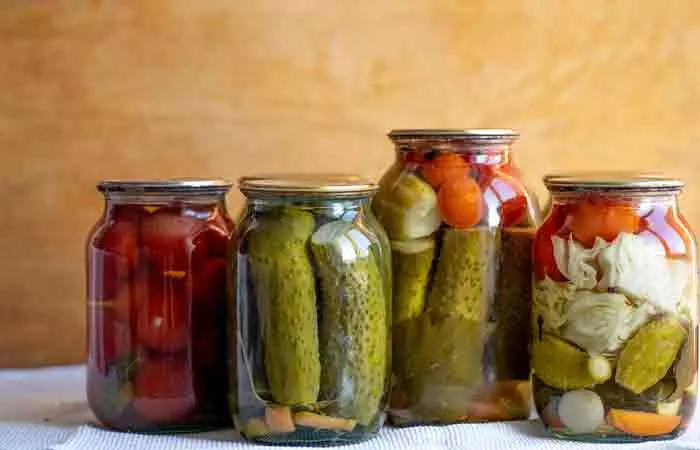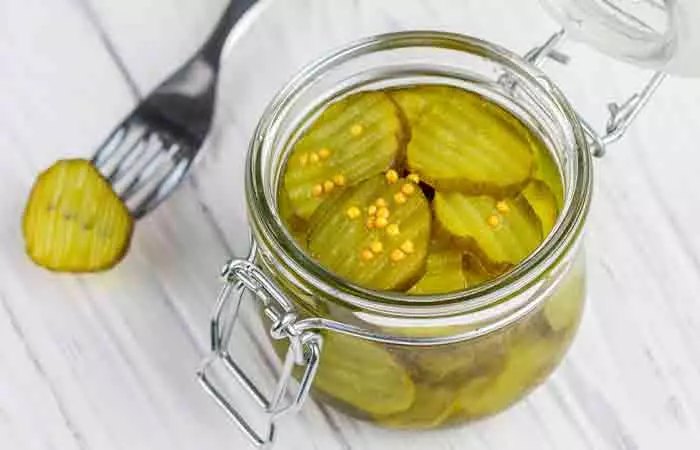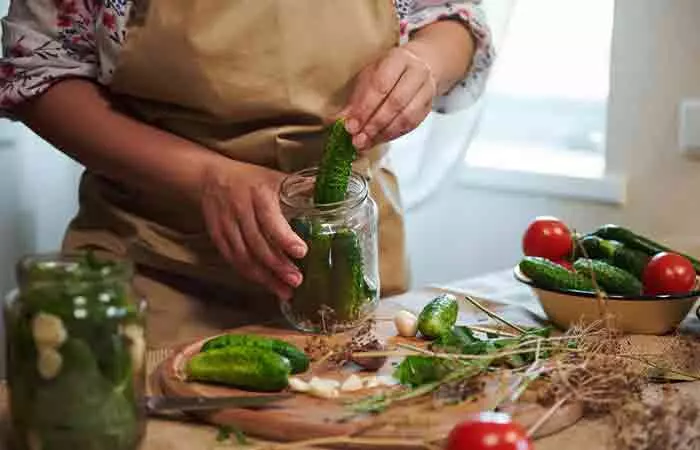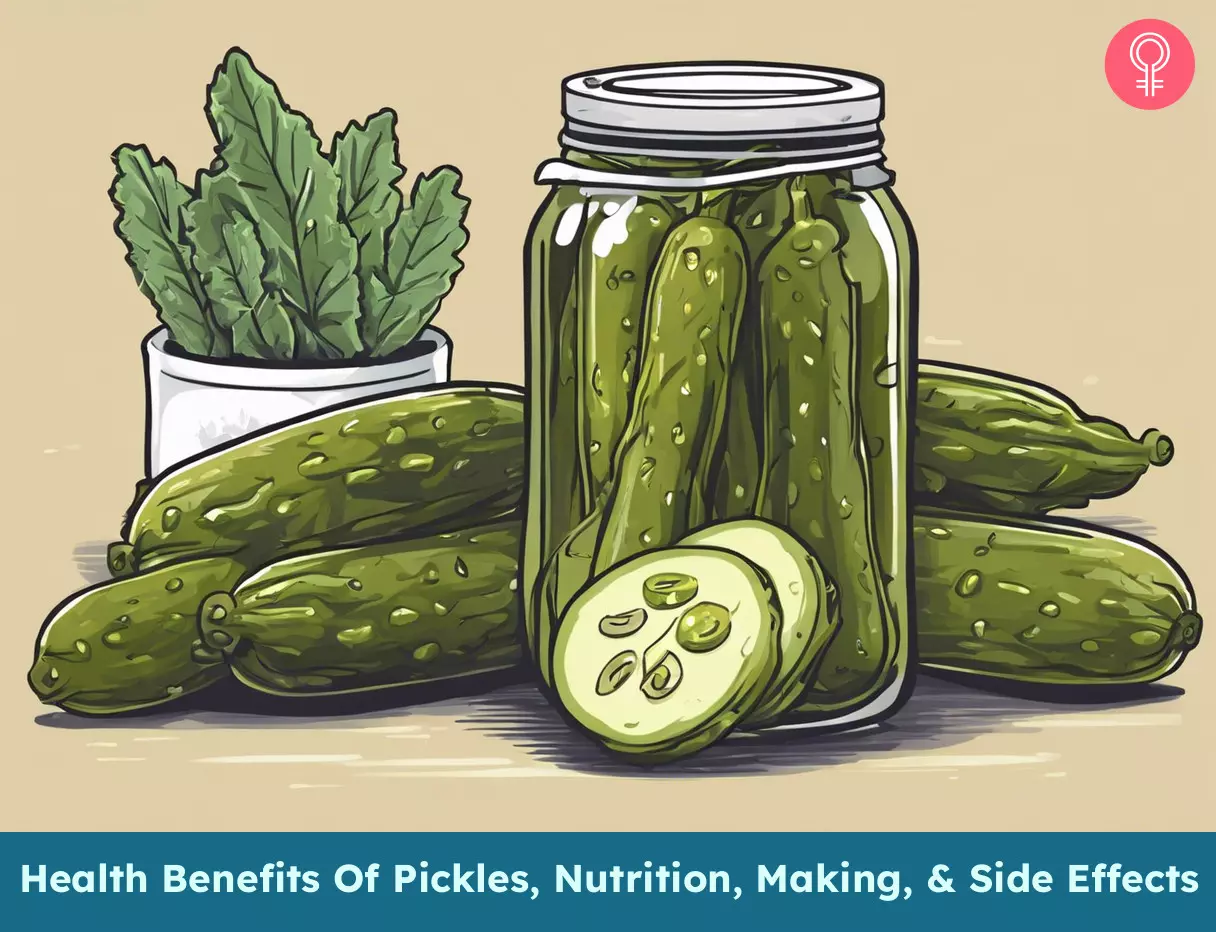Who Can Consume It? Anybody can relish pickles, provided they are not suffering from cancer or gastric disease. How Often? Pickles should be consumed in moderation. 2-3 servings per day is fine. Caution Excessive consumption of pickles can increase the risk of gastric, stomach, and esophageal cancers and may lead to liver and kidney issues.
The ways of pickling may have changed as it crossed boundaries into different countries, but the end goal has remained the same – to extend the shelf life of certain fruits and vegetables. Lactic acid pickles are a traditional way of preserving vegetables. Unlike vinegar-based pickles, lactic acid pickles are made through the process of natural fermentation. In this method, vegetables like cucumbers, carrots, or cabbage are submerged in a brine solution of water and salt and left to ferment for some time. During the fermentation process, the Lactobacillus bacteria consume the vegetables’ sugars and convert them into lactic acid (1). This not only preserves the vegetables but also imparts a tangy and complex flavor to the final product. Lactic acid pickles are celebrated for their probiotic content, which can contribute to gut health (1). They are also prized for their crisp texture and versatility in various dishes. Exploring pickle juice benefits can offer even more insight into how these tangy treats enhance your health and well-being. Pickling improves not only the taste of the foods but also keeps their nutrients intact. Learn more about the nutritional profile of the popular dill pickle in the next section.
Nutrition Profile Of Dill Cucumber Pickle
When you think of pickles, dill pickles are the first to come to your mind. Dill cucumber pickles are the most commonly made pickles that contain healthy nutrients. One large dill pickle (44.6 g) contains the following nutrition profile (2):
Sodium (326 mg) and potassium (46.2 mg) are abundantly found in dill pickles. Calcium comes third at 21.8 mg. Phosphorus and magnesium are next (46 mg and 2.87 mg, respectively). Trace elements like zinc, copper, manganese, and iron are also found in these pickles. Dill pickles are low on carbohydrates (8 g) and fats (0.7 g). It contains only 0.4 g of fiber. When it comes to vitamins, one dill pickle has 848 µg of vitamin C, 81 µg of pantothenic acid (vitamin B5), 44 µg of niacin (vitamin B3), and 18.2 µg of beta-carotene. It also contains 6.87 µg of vitamin K, 48 µg of vitamin E, and 1.68 µg of vitamin A. Other vitamins are present, too, but in trace amounts.
The benefits of cucumber extend beyond their crunchy, tangy taste! They add a nutritious boost to your diet.
Health Benefits Of Pickles
From helping maintain a healthy gut to preventing colorectal cancer, pickle consumption has many purported health benefits of eating pickles. Check them out below.
- May Promote Gut Bacteria Pickles contain good bacteria that help in breaking down sugars in food. This process adds a sour taste to pickles and improves your body’s probiotic health and digestion, which is important for maintaining a healthy gut (3). In addition, multiple studies have concluded that the microflora in fermented pickles improve the gut microbiota (4).
- May Help Regulate Blood Sugar Levels A study conducted on Japanese adults with diabetes showed that consuming fermented foods, including soybeans and pickles, lowered the effects and symptoms of type 2 diabetes (5). In addition, the phytoestrogensi Naturally occurring compounds in fruits, vegetables, and legumes that are beneficial in rebalancing hormones in women. and bioactive peptides present in pickles may help regulate blood sugar levels. However, research in this regard is limited.
- May Help Reduce Cholesterol Levels Research suggests that eating gherkins helps reduce cholesterol levels, thanks to the fermentation by the lactobacillus found in these pickles (6).
- May Help Manage Muscle Cramps An experimental study suggests that drinking pickle brine may help in reducing muscle cramps (7). Your muscles cramp up when there is a lack of hydration, which causes an imbalance in the electrolyte levels in your body. The sodium and potassium present in pickle brine may help improve this situation by balancing the electrolytes and improving hydration in the body. However, research in this regard is limited.
- Help Maintain Electrolyte Levels While On A Keto Diet The low carbohydrate intake in the ketogenic dieti A diet that is low in carbohydrates and high in protein and fats. The main idea is to break down fat for energy by limiting carbs. leads to a reduction in glucose production. This reduction triggers the production of ketone bodies and may cause dehydration. Pickles are rich in sodium and potassium. Intake of these foods rich in these minerals may help maintain a balance in electrolytes and keep your body hydrated (7), (8). However, more research is required to prove this effect of pickles.
- May Reduce Oxidative Damage Pickles contain high amounts of vitamins C and E, which have antioxidant properties. In addition, fermented foods contain essential antioxidants like riboflavin, folate, cobalamin, menaquinone, and thiamine. All these antioxidants help reduce oxidative stress that can cause damage to your body at the cellular level (4). One study suggests that traditional Indian pickles contain antioxidants that may help prevent benzene formation, thus reducing cellular damage (9).
- May Prevent Certain Cancers Pickles are a powerhouse of probiotic bacteria. According to a study conducted in India, probiotic bacteria may help in the prevention of cancerous tumors in the colon, liver, and bladder (10). While pickle juice is still in need of further study, it appears to be a promising candidate for supplying these beneficial bacteria to the body. Fermented pickles also contain certain probiotic strains that may help prevent colorectal cancer (4). Preparing pickles at home is one of the best ways to derive all these benefits without losing too many nutrients to processing. Read on for some simple recipes.
How To Make Pickles At Home
While the traditional dill pickles are made by fermenting cucumbers in saltwater, you can make instant pickles simply by pouring hot vinegar on them. Let’s check out how to make some good old dill pickles at home. You Will Need
1½ pounds of Persian or Kirby cucumbers 4 cloves of garlic (peeled and smashed) 2 teaspoons of dill seeds ½ teaspoon of red chili flakes (optional) 1 cup of rice vinegar 1 cup of water 1½ tablespoons of pickling or kosher salt
Before Making The Pickles
Process Most foods cause certain side effects. Read on to learn about the side effects of eating pickles.
Side Effects Of Pickles
The excess sodium and histaminei A hormone found in the body that is responsible for immune responses like sneezing or a runny nose when encountering an allergy. in pickles may cause issues with your liver and kidneys, though there is not enough research to prove the same. People with high blood pressure or kidney problems should talk to their doctor before eating pickles. Various studies have found that excessive pickle consumption may increase the risk of gastric, stomach, and esophageal cancersi The cancer of the esophagus (the pipe that connects the throat to the stomach). Its main causes include smoking and acid reflux. (11). The study was completed by 372 medical students (22.7 1.1 years old, 66% female). High fermented food consumption was linked to more severe depression (adjusted 0.11) and anxiety symptoms under stress (adjusted 0.13). Eating an excessive amount of pickled food can so disrupt our cognitive senses. More research is needed to know if there are any more side effects of eating too many pickles. You can consume two teaspoons of traditional pickles from time to time. It will add a good nutrient balance to your diet. Is a pickle healthier than a cucumber? No. A pickle is not healthier than a cucumber. Cucumber has low sodium and sugar and is healthier than a pickle. Are pickles a superfood? Yes, pickles are a superfood. Is it OK to eat pickles every day? No, it is not okay to eat pickles every day. The high sodium content may cause hypertension. Are pickles good for your brain? Yes, pickles may help improve your mental health and influence brain health (10). Are dill pickles good for you? Yes, dill pickles are a rich source of vitamin K and calcium. Consuming them strengthens bones and teeth.
Illustration: Health Benefits Of Pickles Nutrition Making & Side Effects
Delve into the surprising health benefits of pickles! From improved digestion to increased nutrient absorption, this video explains why pickles are more than just a tasty condiment. Check it out!












